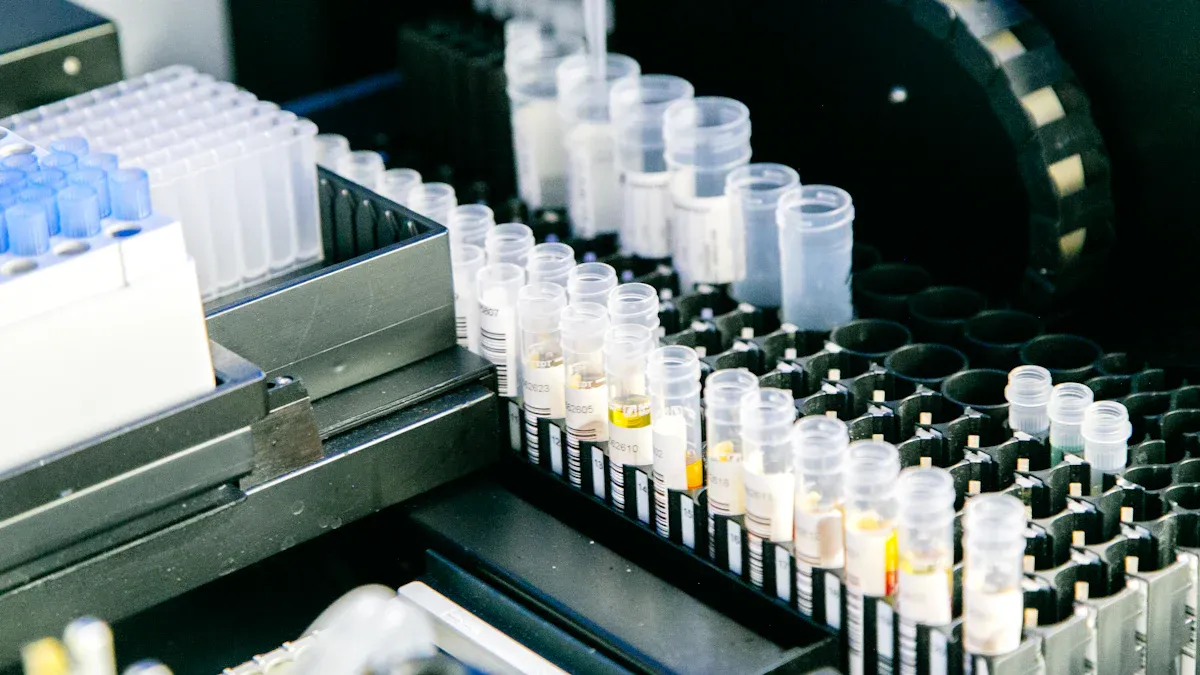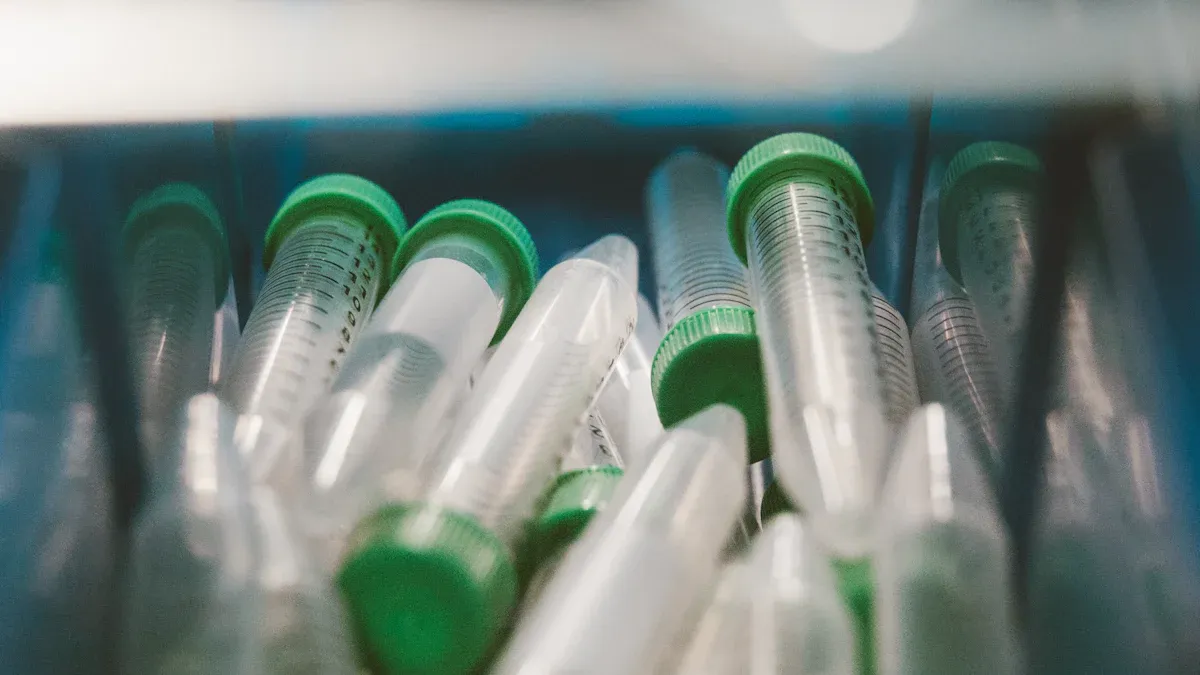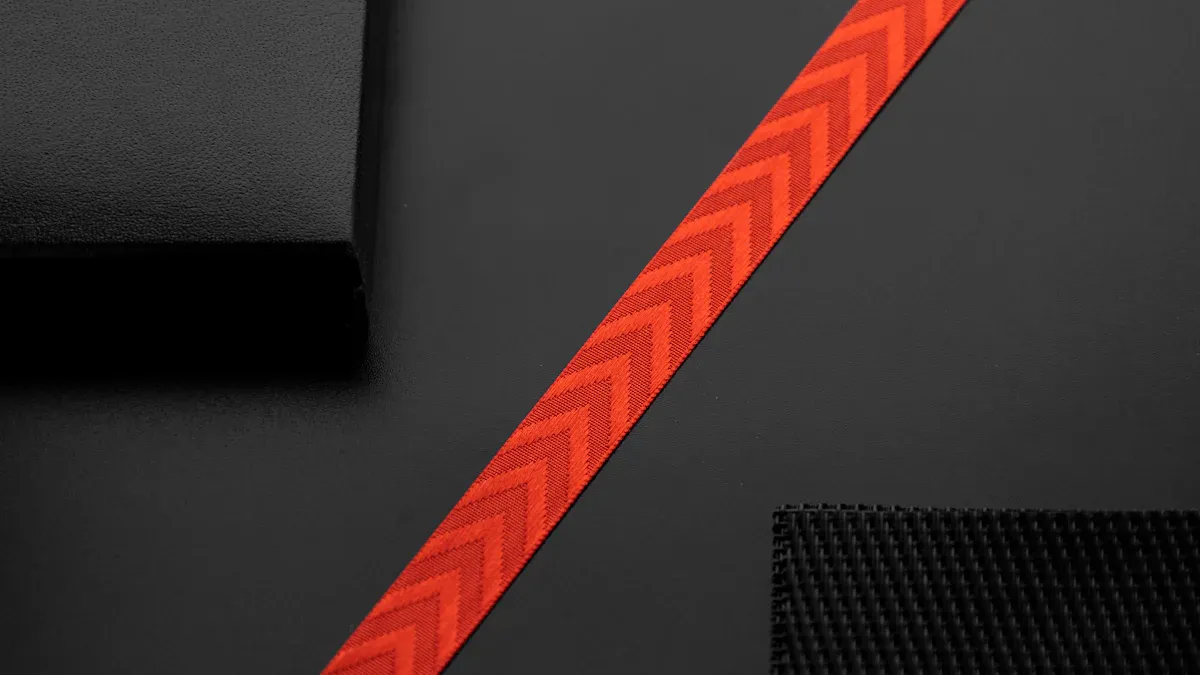How PET Heat Shrink Tubing Optimizes Neurovascular Device Design

In brain and blood vessel treatments, accuracy and safety are key. The neurovascular catheter PET shrink tube enhances the functionality of neurovascular catheters. It is safe for the body and has a long lifespan, making it ideal for medical applications. This PET shrink tube contributes to safer procedures and reduces the risks associated with tiny catheters. It adapts well during use and bends easily to fit blood vessels. Peelable heat shrink tubing simplifies the construction of catheters and increases precision for small surgeries. By minimizing the size of tools, it enhances catheter design, resulting in more reliable and effective devices.
Key Takeaways
PET heat shrink tubing makes neurovascular catheters strong and flexible. This helps make medical procedures safer and work better.
The material is body-safe, lowering the chance of swelling or rejection during treatments.
Heat shrink tubing keeps catheters safe from harm and dirt, helping them work well in tough conditions.
PET tubing can be customized to fit exact medical needs, making neurovascular tools more useful.
Careful testing and safety rules make sure PET tubing meets high medical standards, improving patient care.
Material Properties of Neurovascular Catheter PET Shrink Tube

Strong and Long-Lasting
Neurovascular catheters need tough materials for tricky procedures. The PET shrink tube is very strong and handles stress well. It doesn’t break or bend easily when used in delicate blood vessels. This makes it work better and last longer.
The material is also very durable. It doesn’t wear out quickly, even in busy hospitals. This means fewer replacements are needed, saving money. Using strong and durable materials keeps the device safe and reliable.
Safe for the Body
Materials used in the body must be safe. The PET shrink tube meets strict safety rules, so it’s good for medical use. It lowers the chance of bad reactions like swelling or rejection, keeping patients safe.
This material works well with the body. Its safety helps catheters fit and work in complex body areas. This is important for keeping patients comfortable and safe during treatments.
Handles Heat and Keeps Its Shape
PET shrink tubing can handle high heat without losing its shape. This is important during making or cleaning the catheter. It stays strong and works well even after being heated.
The tubing also keeps its size and shape in different conditions. This makes it dependable for important uses. Whether small or large, it always works as planned, even in tough situations.
Tip: Heat resistance and shape stability are key when using nitinol tubing. They help everything fit and work perfectly.
Heat Shrink Tubing and Its Role in Performance
Flexibility for Complex Neurovascular Anatomy
Flexibility is very important for neurovascular catheters. The material must bend easily to fit the body's pathways. Heat shrink tubing helps catheters move through tight curves and narrow vessels. It keeps performance steady while protecting delicate tissues from harm.
This tubing also works well with smaller devices. Tiny tools make surgeries safer and less invasive for patients. Using heat shrink tubing gives both flexibility and support. This ensures the catheter works well in tough situations.
Note: Flexibility means bending smoothly while staying precise and controlled.
Enhanced Structural Integrity and Device Longevity
Heat shrink tubing makes neurovascular catheters stronger. Its tough material helps the device handle stress during procedures. It protects the catheter from damage, even with repeated use.
Strong tubing also makes the catheter last longer. Fewer replacements save time and money in hospitals. Adding heat shrink tubing keeps the catheter reliable and high-performing for a long time.
Protection Against Abrasion and External Contaminants
Catheters face wear and tear in medical settings. Scratches from tools or tissues can weaken them. Heat shrink tubing shields the catheter from damage, keeping it working properly.
The tubing also blocks harmful substances. Its safe material works well inside the body and prevents contamination. This double protection makes heat shrink tubing a key part of neurovascular devices.
Tip: Choose tubing that protects against damage and contamination for better results.
Applications of PET Heat Shrink Tubing in Neurovascular Catheters

Strengthening for Better Durability and Safety
PET heat shrink tubing helps make neurovascular catheters stronger. Its tough material keeps the catheter durable during hard procedures. This tubing gives extra support when moving through tricky blood vessels. It lowers the chance of the catheter breaking, making it safer to use.
PET tubing also adjusts to fit the catheter without losing strength. This makes it great for uses needing both toughness and flexibility. Using PET heat shrink tubing ensures the catheter works well, even in tough situations.
Connecting Catheter Parts Securely
Joining catheter parts needs to be exact and strong. PET heat shrink tubing makes this easier by forming tight, smooth connections. For example, engineers follow these steps to join wires:
Step | Description |
|---|---|
1 | Put a little solder paste inside the PET heat shrink tubing. |
2 | Overlap the wire ends where the solder paste is placed. |
3 | Heat the tubing to melt the solder and connect the wires. |
4 | Add another PET heat shrink layer for extra protection. |
5 | Group the wires together for the final design. |
This method keeps catheter parts joined securely, improving how long they last. PET tubing is also safe for the body, making it perfect for medical tools.
Smoother Surface for Easier Use
Catheters need to slide smoothly into blood vessels. PET heat shrink tubing makes the surface less sticky, so it moves easily. This reduces harm to soft tissues, helping patients feel better.
The tubing can also peel away to make smaller, thinner devices. This allows for more flexible and precise tools for surgeries. By reducing friction and making insertion smoother, PET tubing improves how well catheters work.
Manufacturing and Customization of Heat Shrink Tubing
Advanced Methods for Accurate Results
Making neurovascular catheters needs great precision. Special methods help heat shrink tubing meet exact needs. Here are some ways this is done:
Laser cutting shapes the tubing to fit tricky pathways.
3D printing makes custom designs while saving materials.
Cold working strengthens nitinol, making it last longer and bend better.
Heat treatment improves nitinol’s flexibility and memory to hold shapes.
These methods make tubing work well in tough situations. They also help create smaller tools for safer surgeries.
Custom Designs for Neurovascular Tools
Customizing tubing is key for better neurovascular catheters. Manufacturers adjust tubing to meet specific needs for these tools. For example, peelable tubing makes assembly easier by being simple to remove.
Custom designs solve problems like body safety and fitting into tight spaces. Engineers can change tubing size, shrink levels, and materials. This helps catheters fit perfectly in delicate areas. Customization makes devices safer and more effective during procedures.
Testing for Reliable Performance
Neurovascular catheters must work the same every time. Quality checks ensure heat shrink tubing meets strict rules. Tests include:
Property | Standard | Test Method | Unit | Spec | Result |
|---|---|---|---|---|---|
Tensile Strength at Yield | ASTM F2026 | ASTM D638, Type IV | MPa | 90 | 105 |
Elongation at Break | ASTM F2026 | ASTM D638, Type IV | % | 5 | 18 |
Flexural Modulus | ASTM F2026 | ASTM D790 | GPa | 3 | 4 |
These tests check strength, flexibility, and body safety. Other steps, like process checks and records, keep quality steady. Following these rules ensures tubing works well in neurovascular tools.
Compliance and Safety Standards for Neurovascular Catheters
Following Medical Rules
Neurovascular catheters must work safely during important procedures. Groups like the FDA and CE make sure these devices follow strict rules. PET heat shrink tubing helps meet these rules by staying strong and flexible under tough conditions.
Group | Rule | What It Means |
|---|---|---|
FDA | Quality System Regulation (21 CFR Part 820) | Tracks materials, how they’re made, and if they can be cleaned. |
CE | EU Medical Device Regulation (MDR) 2017/745 | Needs proof and tests for Class IIa/IIb devices. |
These rules make sure catheters are high quality. PET tubing’s strength and flexibility help meet these rules, making it very useful for medical tools.
Testing for Body Safety
Catheters need safe materials that work well with the body. PET heat shrink tubing goes through many tests to prove it’s safe. These tests check that it won’t cause swelling or rejection during use.
Certifications show the tubing is safe for medical use. Tests check its strength, chemical safety, and how well it works in different situations. By passing these tests, PET tubing makes catheters safer for patients.
Keeping Patients Safe with Quality Checks
Patient safety needs reliable tools. PET heat shrink tubing improves catheter performance with strict quality checks. Makers test the tubing to meet safety rules like IEC 60601-1.
AccuPath PET Tubing uses strong, high-quality materials for better tools.
It resists chemicals and protects important parts from damage.
Careful testing ensures it works well every time and builds trust.
These steps make sure catheters stay safe and work well during use. PET tubing’s small size and flexibility also help improve neurovascular tools.
PET heat shrink tubing helps make neurovascular catheters better. Its special materials are safe for the body and very flexible. This flexibility helps catheters move easily through tricky brain pathways. The tubing also allows for smaller and more accurate devices. By following strict rules, it ensures safe and dependable use. This technology improves patient care and supports modern medical tools. It is an important part of today’s healthcare advancements.
FAQ
Why is PET heat shrink tubing good for neurovascular catheters?
It is strong, safe for the body, and handles heat well. These qualities make it durable, flexible, and safe during surgeries.
How does heat shrink tubing help catheters work better?
It makes catheters stronger, protects them from scratches, and helps them slide smoothly. This improves how long they last and how well they work in tough procedures.
Is PET heat shrink tubing safe to use in medicine?
Yes, it follows strict safety rules for medical tools. It lowers risks like swelling or rejection, keeping patients safe during treatments.
Can PET heat shrink tubing be made for special tools?
Yes, makers can change its size, shape, and surface to fit needs. This helps it work better for specific neurovascular tools.
How does PET tubing stay reliable?
Careful manufacturing and testing keep it strong, flexible, and safe. This ensures it works well in important medical procedures.
See Also
The Importance of Ultra-Thin PET Tubing in Healthcare Devices
Essential Insights on PET Heat Shrink Tubing for Electronics
Enhancing Neurosurgical Catheter Performance with FEP Shrink Tubing
Latest Innovations in FEP Shrink Tubing for Medical Applications
Selecting Ideal Ultra-Thin PET Heat Shrink Tubing for Projects

